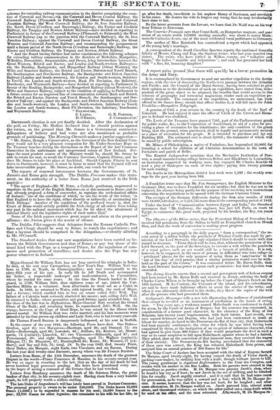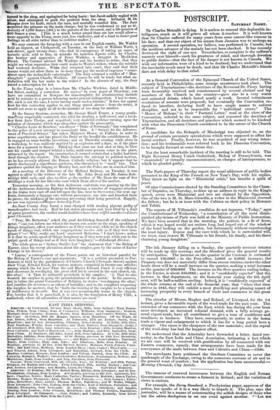According to a paragraph in the daily papers," from a
correspondent," the recent arrest of a debtor within the precincts of Windsor Castle was made by per mission of the Lord Steward; who only stipulated that it should be made with duo regard to decorum. "From this it will be seen, that, without the permission of the Lord Steward, on the part of the Sovereign, to execute a writ within the precincts of a royal palace, such an act would still be a breach of privilege. It is not, i however, to be supposed, in the cases of persons in difficulties who take refuge n privileged' places, for the only purpose of using them as sanctuaries' to be out of the way' of civil process, that a similar permission would ever be withheld on the part of the Crown." It was contended before Mr. Baron Rolfe, that the Lord Steward had no power to grant such permission: but that objection was overruled.
The Jersey Gazette asserts that a second and peremptory writ of habeas corpus had been issued by Mr. Baron Rolfe and received in Jersey, ordering the body of Charles Carus Wilson to be brought up before the Court of Queen's Bench on the 18th instant. M. Le Couteur, the Viscount of the island, and his subordinates, are said to have made ludicrous efforts to avoid the service of the writs; and when it was ultimately delivered to his clerks, they threw the copies of the writ after the persons who had presented them.
Galignanis Messenger tells a new tale illustrating the unfitness of punishment' that cannot be recalled as an instrument of retribution in the hands of erring man. "Two years ago, a workman named Haberlandt was condemned to death for arson, by the Court of Assize of Bruges; but his sentence was commuted, in, consideration of a former good character, by the clemency of the King of the Belgians, into twenty years imprisonment, with bard labour. Last month, twe men named Schlosser and Depnm, who had just been condemned to death at Ghent for murder, declared to the Procureur-du-Roi of that city, that Haberlandt had been unjustly condemned; the crime for which be was tried having been committed by them, at the instigation of an ex-priest of infamous character, who had agreed to give them 300 francs if they would perpetrate the deed in such a way as to cause suspicion to fall upon Haberlandt, against whom he had a hatred. They added, that on the conviction of that innocent man, they received the vragea of their atrocity. The Procurenr-du-Roi having ascertained that the statement of these men was correct, the King has released Ilaberlandt from prison, and. assigned him an annual pension of 300 francs for life." The Seine Court of Assizes has been occupied with the trial of Eugene Sanwa Be Maupas, aged twenty-eight, for having caused the death of Victor Jacob_
• -case-maker, by striking him with a knife, though without intent to b.11. The young gentleman is Aspirant Referetadaire to the Cour des Comptes, and resides with his mother in the Rue Laffite. Both his parents were entered in the. proceedings as parties dram M. Be Manpas was passing Jacob's shop, when he heard a boy cryas if hurt; he saw Jacob in the act of striking, and he rebuked him for cruelty. Jacob angrily retorted, and it is said that he had some cause for provocation, as he was called a coward and a fool; which M. De Maupas denies. It seems, however, that the boy was not hurt, for he laughed; and after some altercation, M. Be Manpas walked on. Jacob pursued him, uttered some abuse, and threatened violence; on which the other pulled out a clasp-knife which he used at his office, and the man retreated. Ahtcrwards5 M. De Manpas re • turned le the shop, and apologized for being hasty: but Jacob sulkily replied with abuse, and attempted to push the penitent from the shop. Irritated, M. De Pamirs drew his ife, struck the man, and mortally wounded him. The Jury doquitted the prisoner on the main charge; but he was condemned to pay an indemnity of 1,000 francs (401.) to the parents of the deceased, and a life-pension of WO francs a year. [This is a much better award than our law would allow— More apposite to the wrong, more just, lees vindictive, and of a kind to foster good feelings on all aides rather than to embitter malice.] We may contrast the foregoing with a case in our English courts. Mr. Wakley held an inquest, at Clerkenwell, on Tuesday, on the body of William Watts, a cab-driver, aged twenty-four; who died in consequence of taking an ounce of tartaric acid, sold to him, in mistake for tasteless Epsom silts„ by Charles, the brother and apprentice of Peter Watkins, a druggist in Myddelton street. The Coroner advised Mr. Watkins and his brother to retire, that they Slight see what reparation they could make to Watts's widow, whom the mistake had rendered destitute. When they returned into court, they said that their means would not allow them to do more than pay the medical expenses " censeTient upon the Melancholy catastrophe." The atu7 returned a verdict of " Manslaughter " against Charles Watkins. Of course he will be tried; but what satiefaction Will the law make to the widow ? In the absence of any, the Jury raised a subscription for her. In the Times today is a letter from Mr. Charles Watkins, dated in Middleton Street, making a correction. He says—" In your paper of Thurdsay, you have me committed to Newgate for manslaughter, for administering tartaric acid by mistake to a person labouring under general indisposition. I beg to state, Sir, such is not the ease, I never having made such a mistake." It does not appear how far this correction applies to any thing stated shoves: from the terms, it would not seem to apply at all to the mistake of one drug for another.
At the Surrey Sessions, yesterday, Mr. George Hazel Frazer, a young gentleInanTvery respectably connected, was tried for stealing a half-crown and a latchkey from Anne Thorpe, and acquitted ; very doubtful evidence turning upon the question of character, which was altogether against the prosecutrix.
"Charles Louis de Bourbon," soi-disant "Duke of Normandy," has complained to the police of a new attempt to assassinate him. A" Society for the Advancement of Practical Science" has taken Mulgrave House, at Fulham, in order to some experiments, and has placed the Duke at the headfof the establishment. He is engaged on some warlike inventions ; and on Thursday evening, while alone in a workshop, he was suddenly startled by an explosion and a flare' as if the place were for a moment in flames. Thinking that some one had shot at him, be 'blew Out his candle and stooped behind a lathe, until some persons came to the place, attracted by the report. On examination, it seemed certain that a bullet had been fired through the window. The Duke imputes the attempt to political motives, as he has recently abjured the Roman Catholic religion; but it appears that he lately discharged a superfluous gardener, who threatened to "mark him. That gardener quitted his lodging on Monday Last, and the Police are in search of him.
At a meeting of the Directors of the Midland Railway, on Tuesday, it was agreed to allow to the widows of the late Mr. John Dean and Mr. James Bole. Stridge 8001. each; and also, to allow to the mother of Mr. Dean the sum of five shillings a week for her life—the sum which Dean allowed his mother.
Yesterday morning, as the first Ardrossan coal-train was passing up the line of the Ardrossan Junction Railway to Kilwinning, a number of waggons attached to the trains were cast off and left upon the line, near to Stevenston; the next uptrain, fortunately a luggage one, without passengers ran into and knocked them to pieces; the darkness of the morning preventing their being perceived. Happily, no one was injured.—Grasgow Saturday Post.
• An East County Jury found a man charged with stealing pigeons guilty of anarislaughter, last week. Had he but stolen pheasants and been tried by a Jury of game-preservers, the verdict would doubtless have been wilful murder.—Liverpool Chronicle.
"Pray, Mr. Betterton," asked the good Archbishop Sancroft of the celebrated actor, " canyou inform me what is the reason you actors on the stage, speaking of imaginary, affect your audience as if they were real; while we in the church speak of things real, which our congregations receive only as if they were imaginary? "—" Why, really, my Lord.," answered Betterton, I don't know; unless it, is that we actors speak of things imaginary as if they were real, while you in the pulpit speak of things real as if they were imaginary. —Edinburgh Review.
The Globe gives as" Sydney Smith's last" the statement that " the Bishop of Exeter, since his recent alterations about the surplice, goes by the name of Exeter Change in his diocese."
" Laiens," a correspondent of the Times, points out an historical parallel for the Bishop of Exeter's case and arguments. "It is a petition presented to Parliament in 1641 by the parishioners of Christ's Church (Newgate Street) against their Vicar, Edward Finch, for various matters, comprised in twenty-one articles; am'. which which the 1st is—' That the said Master Edward Finch is very officious and servant in worshiping the great idoll lately erected in the said church, viz. the altar.' '4. That he ordinarily preacheth in his surplice.' '5. That he also weareth his surplice in going the perambulations of the parish.' In his answers, put in before the grand Committee of Religion, he denies worshipping the altar,' and justifies his reverences as tokens of hmnffity ; and to the complaint respecting the surplice, he answers, that he holds the wearing of the surplice to be a matter of indifferency in its selfe. But it was ever accustornably worne in the church. For, besides that it is parochiall, it is also, by the foundation of Henry VIII, a cathedrall, where all solemnities of that nature are used."























































 Previous page
Previous page